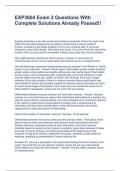Exp3 Study guides, Class notes & Summaries
Looking for the best study guides, study notes and summaries about Exp3? On this page you'll find 48 study documents about Exp3.
Page 3 out of 48 results
Sort by
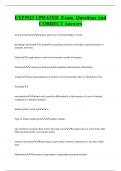
-
EXP3523 UPDATED Exam Questions And CORRECT Answers
- Exam (elaborations) • 7 pages • 2024
-
- $7.99
- + learn more
lexical memoryDictionary where our word knowledge is stored spreading activationa method for searching associative networks, neural networks, or semantic networks. Nodesa single point or unit in an associative model of memory. Schemasa concept or framework that organizes and interprets information scriptsbroad representations in memory of events and the order in which they occur Priming
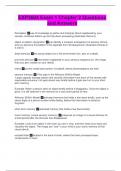
-
EXP3604 Exam 1 Chapter 2 Questions and Answers
- Exam (elaborations) • 5 pages • 2024
-
Available in package deal
-
- $9.99
- + learn more
Perception use of knowledge to gather and interpret stimuli registered by your senses; combines bottom-up and top-down processing (illustrates theme 5) object or pattern recognition you identify a complex arrangement of sensory stimuli, and you perceive this pattern to be separate from its background. (illustrates themes 2, 4 and 5) distal stimulus the actual object out in the environment (ex. pen on a desk) proximal stimulus information registered on your sensory receptors (ex. the image tha...
EXP3604 Exam 2 Questions With Complete Solutions Already Passed!!
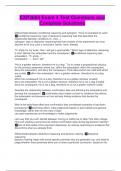
-
EXP3604 Exam 4 Test Questions and Complete Solutions
- Exam (elaborations) • 5 pages • 2024
-
Available in package deal
-
- $9.49
- + learn more
Differentiate between conditional reasoning and syllogism. Think of examples for each. conditional reasoning: type of deductive reasoning task that describes the relationship between conditions (if...then...) syllogism: type of deductive reasoning task that consists of two statements we must assume to be true, plus a conclusion (some, none, always) "If I study for my exam, then I will get a good grade." Which type of deductive reasoning is this? Identify the antecedent and the consequent. con...
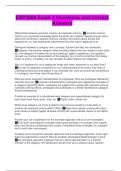
-
EXP3604 Exam 3 Questions and Correct Answers
- Exam (elaborations) • 4 pages • 2024
-
Available in package deal
-
- $8.99
- + learn more
Differentiate between semantic memory and episodic memory. semantic memory refers to our organized knowledge about the world, but it doesn't specify how we came about that information; episodic memory contains information about events that happened to us, and emphasizes when/where/how that event happened to us Distinguish between a category and a concept. Explain how they are connected. category: the physical category where we place objects that are related to each other (ex: the category frui...
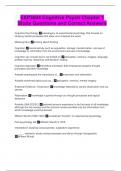
-
EXP3604 Cognitive Psych Chapter 1 Study Questions and Correct Answers
- Exam (elaborations) • 6 pages • 2024
-
Available in package deal
-
- $9.99
- + learn more
Cognitive Psychology subcategory of experimental psychology that focuses on studying mental processes that allow us to interpret the world Metacognition thinking about thinking Cognition mental activity such as acquisition, storage, transformation, and use of knowledge or information from the environment and use of knowledge Cognition can include (but is not limited to) perception, memory, imagery, language, problem solving, reasoning, and decision making Cognitive Approach theoretical orien...
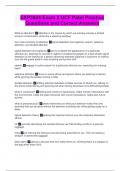
-
EXP3604 Exam 2 UCF Patel Practice Questions and Correct Answers
- Exam (elaborations) • 5 pages • 2024
-
Available in package deal
-
- $8.99
- + learn more
What is attention? Attention is the means by which we actively process a limited amount of information (think like a selective window) four main functions of attention signal detection and vigilance, search, selective attention, and divided attention signal detection and vigilance we try to detect the appearance of a particular stimulus (ex. listening for sounds or sights of unwelcome people on a dark street) signal detection is like looking for a person drowning whereas vigilance is long term...
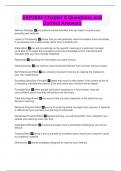
-
EXP3604 Chapter 6 Questions and Correct Answers
- Exam (elaborations) • 3 pages • 2024
-
Available in package deal
-
- $8.99
- + learn more
Memory Strategy you preform mental activities that can help to improve your encoding and retrieval Levels of Processing shows that you will generally recall information more accurately if you process it at a deep levels rather than a shallow one Elaboration you will concentrate on the specific meaning of a particular concept; you'll also try to relate this concept to your prior knowledge and to interconnected concepts that you have already mastered Rehearsal repeating the information you wan...
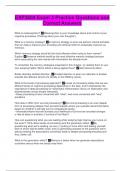
-
EXP3604 Exam 3 Practice Questions and Correct Answers
- Exam (elaborations) • 3 pages • 2024
-
Available in package deal
-
- $8.99
- + learn more
What is metacognition? Metacognition is your knowledge about and control of your cognitive processes ("thinking about your own thoughts"). What is a memory strategy? A memory strategy is when we perform mental activities that can help to improve your encoding and retrieval (effort to essentially improve our memory). Which memory strategy would be the most effective when trying to learn names? Explain Keyword method would be the most effective memory strategy because we're associating the ne...
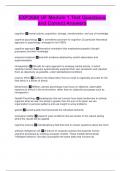
-
EXP3604 UF Module 1 Test Questions and Correct Answers
- Exam (elaborations) • 3 pages • 2024
-
Available in package deal
-
- $8.99
- + learn more
cognition mental activity; acquisition, storage, transformation, and use of knowledge cognitive psychology (1) sometimes synonym for cognition (2) particular theoretical approach to psychology; emerged in mid 1950's cognitive approach theoretical orientation that emphasizes people's thought processes and their knowledge empirical evidence scientific evidence obtained by careful observation and experimentation introspection (Wundt) An early approach to studying mental activity, in which car...

Did you know that on average a seller on Stuvia earns $82 per month selling study resources? Hmm, hint, hint. Discover all about earning on Stuvia

